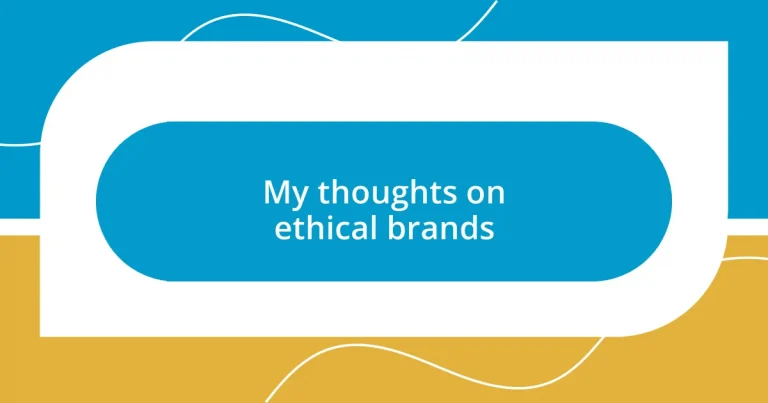Key takeaways:
- Exploring ethical brands led to a shift in consumer mindset, emphasizing the importance of supporting companies that practice transparency, fair labor, and environmental sustainability.
- Ethical business practices foster consumer loyalty, enhance reputation, and contribute to long-term success, encouraging stronger connections between brands and customers.
- Intentional shopping choices, such as supporting local businesses and ethical brands, can create a meaningful impact and inspire others to adopt more responsible consumption habits.
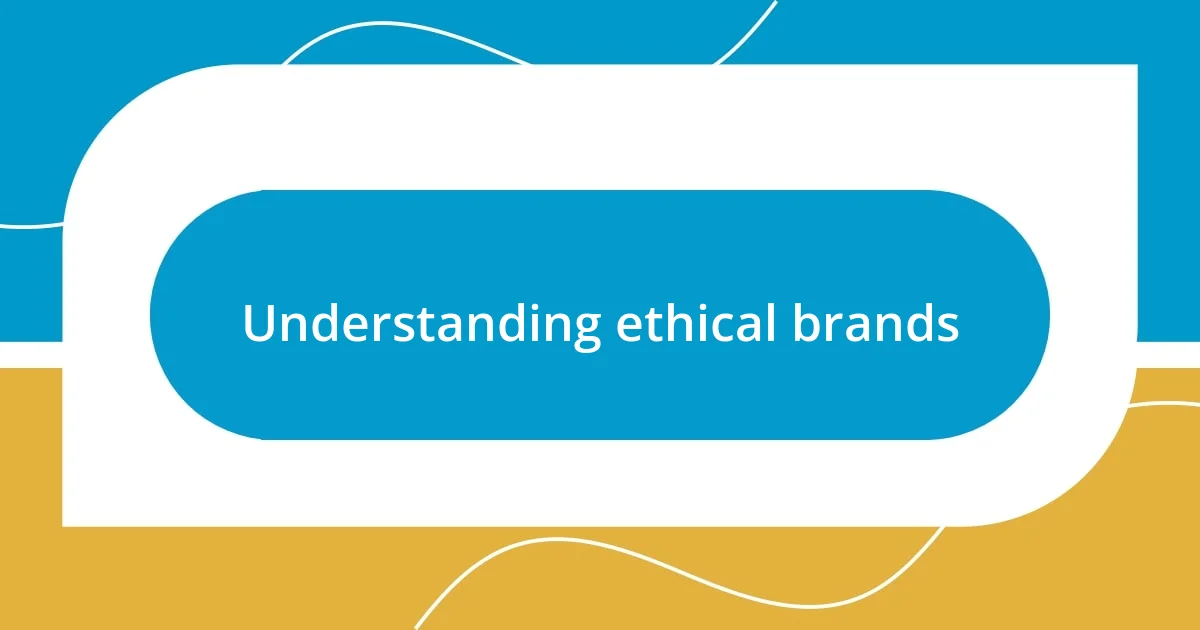
Understanding ethical brands
When I first started exploring ethical brands, I was surprised by how many companies genuinely prioritize social and environmental responsibilities. It made me question my own purchasing habits: was I contributing to brands that exploit labor or harm the planet? This reflection was eye-opening and pushed me to seek brands aligning with my values.
Ethical brands consciously strive to make a positive impact, focusing on sustainable materials and fair labor practices. I remember discovering a small clothing company that sourced its fabrics from local artisans and paid them fair wages. Learning about the personal stories behind the products gave me a deeper appreciation for what I was buying. Isn’t it inspiring to think that every purchase can support someone’s livelihood?
Moreover, the journey of understanding ethical brands often involves grappling with the complexities of certification. Words like “organic” and “fair trade” have specific meanings, and it’s vital to dig deeper. I’ve found that engaging with brands directly, whether through social media or their websites, helps clarify their practices. Have you ever looked at a brand and wondered about the true impact of your purchase? Taking that moment to investigate can lead to more informed and satisfying choices.
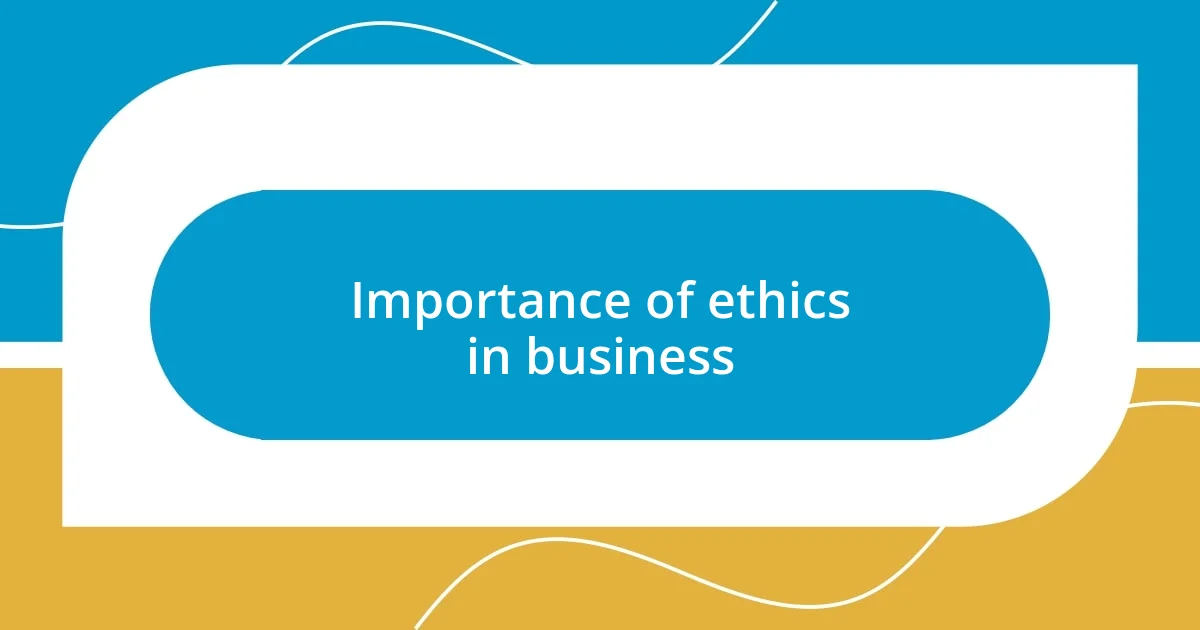
Importance of ethics in business
Ethics in business transcends mere compliance; it’s about cultivating trust and credibility with consumers. I vividly remember a conversation with a friend who refused to buy from a company caught in a scandal over unsafe labor conditions. It made me realize how quickly public perception can shift. When businesses prioritize ethical practices, they foster loyalty and build stronger connections with their customers, creating a foundation that can withstand the test of time.
Here are some key benefits of maintaining ethical standards in business:
- Consumer Loyalty: Customers are more likely to return to brands that align with their values, leading to repeat business.
- Reputation: A solid ethical reputation can differentiate a company in a crowded market.
- Long-Term Success: Businesses that practice ethics often experience sustainable growth, as they are playing the long game rather than chasing short-term profits.
- Employee Satisfaction: Ethical workplaces tend to attract and retain talent, as employees feel proud to be part of a company that does good.
- Innovation: Committing to sustainable practices often leads to creative solutions and innovations that benefit both the company and the environment.
Reflecting on these points, I can’t help but think about my choices as a consumer. It’s rewarding to know that my decisions contribute to a more just and equitable world, even if it feels small on an individual level.
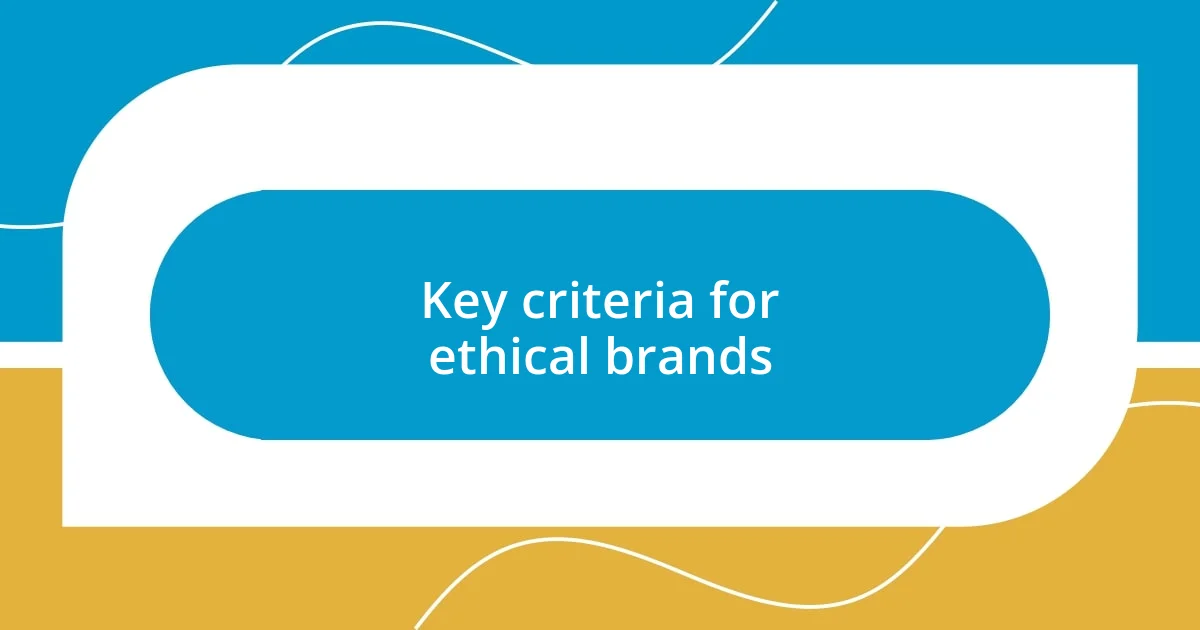
Key criteria for ethical brands
There are several important criteria to consider when evaluating what makes a brand ethical. First and foremost, look for transparency. Brands should openly share their sourcing practices, labor conditions, and environmental impact. I recall visiting an artisans’ co-op that not only showcased their handmade goods but also displayed information about the makers, their wages, and the sustainability of materials used. This level of openness made me trust them more and feel good about my purchases.
Additionally, fair labor practices are crucial. A brand that pays fair wages and offers safe working conditions is one I want to support. I remember when I found out a popular company had been underpaying its workers overseas. It hit hard, making me rethink my loyalty. I now prioritize brands that ensure their workers are treated with respect and dignity, knowing that it reflects their overall ethos.
Finally, environmental sustainability can’t be overlooked. Ethical brands typically use eco-friendly materials and promote practices that minimize waste. Last summer, I attended a workshop hosted by a sustainable fashion brand that educated consumers on the impact of textile waste. The experience opened my eyes to the larger consequences of my buying decisions. I believe that an ethical brand should actively contribute to protecting our planet; it’s not just a nice-to-have but a necessity.
| Key Criteria | Description |
|---|---|
| Transparency | Openly share sourcing practices and labor conditions. |
| Fair Labor Practices | Ensure fair wages and safe working environments. |
| Environmental Sustainability | Utilize eco-friendly materials and promote waste reduction. |
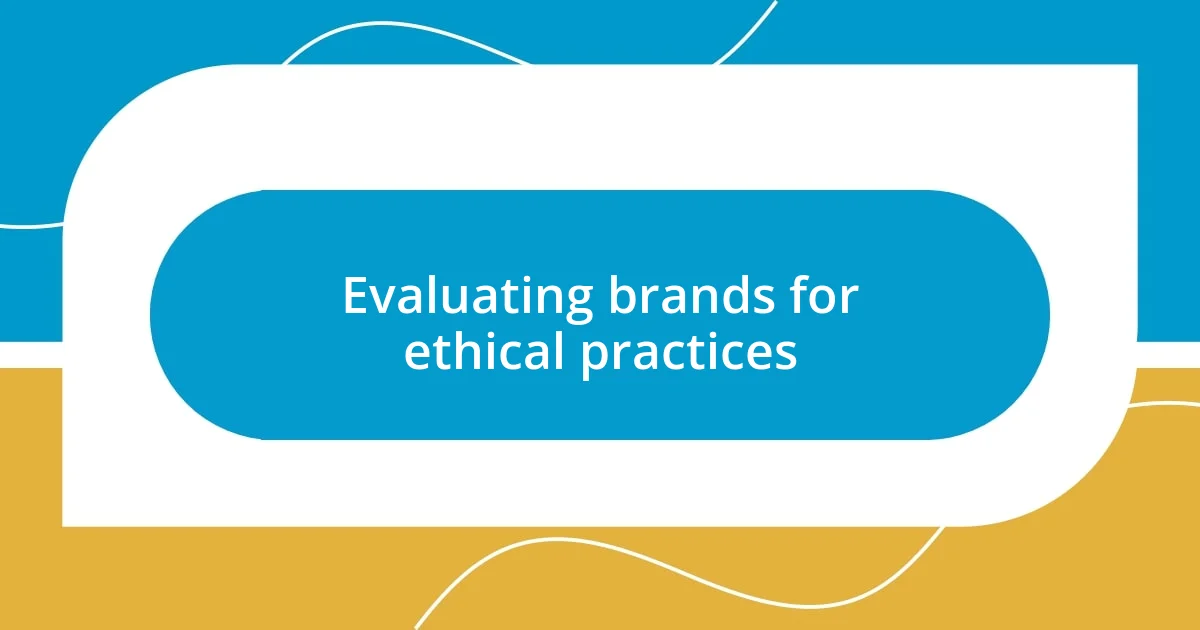
Evaluating brands for ethical practices
When I’m evaluating brands for their ethical practices, I always start by checking how they communicate their values. For instance, I once came across a skincare line that not only shared their sourcing but also featured stories from the farmers who grew their ingredients. It struck me how impactful personal narratives can be in shaping my perception. Doesn’t the humanity behind a product make you more inclined to support it?
Moreover, I pay close attention to companies’ commitments to social and environmental causes. I remember discovering a clothing brand that donated a portion of each sale to clean water initiatives. This made me feel much more connected to my purchase, knowing it contributed to a greater good. How often do we consider the ripple effect our spending can have? It’s encouraging to think that our choices can directly support communities in need.
Lastly, I evaluate how brands handle sustainability and innovation. One time, I learned about a shoe company that created footwear from recycled plastic bottles. It amazed me that something as simple as a pair of shoes could be born from a commitment to reducing waste. This kind of creativity in ethical practices not only inspires me but also reinforces my trust in the brand. Are we not more likely to champion those who work hard to leave the planet better than they found it?
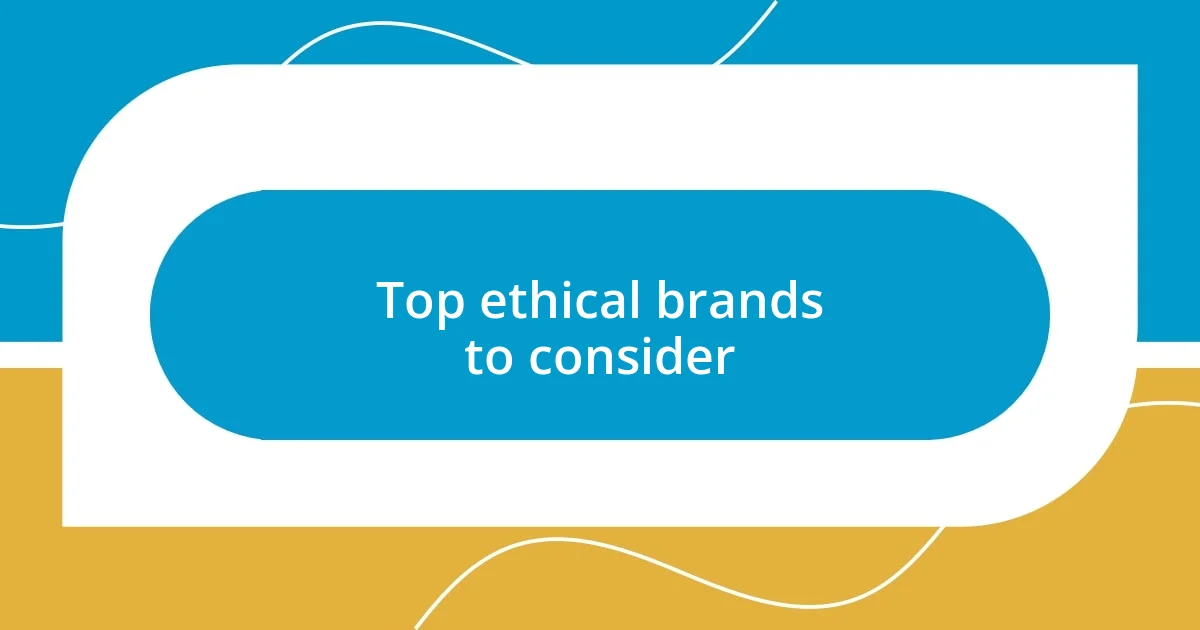
Top ethical brands to consider
One brand that consistently captures my attention is Patagonia. Their commitment to environmental activism is undeniably impressive. I remember the first time I saw their “Don’t Buy This Jacket” campaign. It wasn’t just a clever marketing tactic; it truly made me think about the impact of consumerism. Their emphasis on repairing and recycling gear instead of encouraging mindless consumption resonates deeply with my values. How often do we pause to consider the consequences of our purchases?
Another standout for me is Allbirds, known for its sustainable footwear made from natural materials like merino wool and eucalyptus. When I bought my first pair, I was drawn not only to their comfort but also to their environmental mission. It made me reflect on how our choices can influence corporate practices. It’s refreshing to support a company that encourages sustainability, showing that style doesn’t have to come at the planet’s expense. Isn’t it empowering to wear something that aligns with our beliefs?
Lastly, I can’t overlook the impact of Warby Parker, which combines stylish eyewear with a one-for-one model. For every pair purchased, they distribute a pair to someone in need. I often think back to the time I gifted eyeglasses to a friend who had never owned a pair. Seeing the joy on her face reminded me of how something seemingly small can change lives. Supporting brands that give back makes me feel like a part of something bigger. Who wouldn’t want their shopping to make a difference?
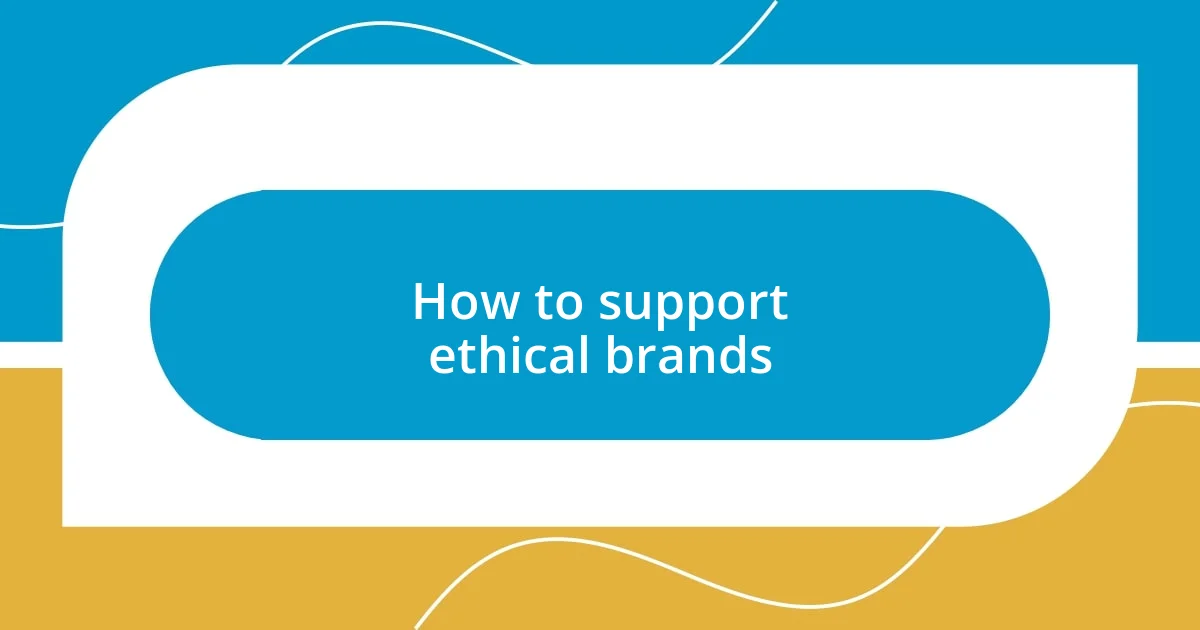
How to support ethical brands
When it comes to supporting ethical brands, I find that being intentional with my shopping choices makes a world of difference. Last year, I decided to switch to local grocery stores instead of big chains, and it felt great to see where my money was going. Have you ever noticed how shopping locally fosters a sense of community? It’s more than just a transaction; it creates connections.
I also make it a point to spread the word about brands that impress me with their ethical practices. A few months back, I shared a post on social media about a fair-trade coffee company that supports farmers with direct trade and fair wages. The response was overwhelming, and it made me realize how impactful word-of-mouth can be. Do you think your friends would appreciate knowing about brands that align with their values?
Lastly, I’ve learned the power of choosing quality over quantity. After I found an ethical fashion brand that focuses on timeless pieces, I began investing in a smaller wardrobe. Not only did it simplify my life, but it also kept my spending aligned with my commitment to sustainability. Doesn’t it feel satisfying to own pieces that are not just beautiful, but also reflect your beliefs? Supporting ethical brands can truly transform both your wardrobe and your world.
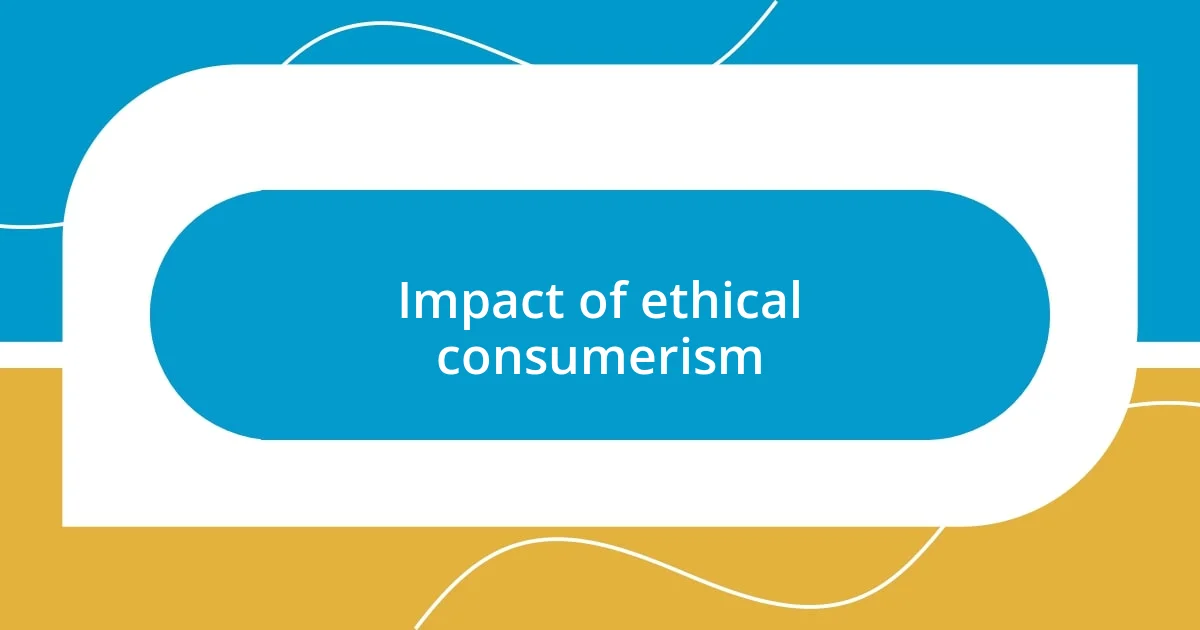
Impact of ethical consumerism
Ethical consumerism has genuinely reshaped my perspective on how I shop and the lasting effects of my choices. A memorable moment for me was when I attended a local farmers’ market for the first time. I was struck by the direct connection between the producers and consumers; knowing that my money supported local farmers brought a sense of fulfillment that large retailers never provided. Isn’t it inspiring to think that every ethical purchase can uplift someone’s livelihood?
I’ve also witnessed the ripple effect ethical brands can have on industry standards. A friend once introduced me to a skincare line that emphasizes cruelty-free testing and environmentally sustainable packaging. I remember feeling a surge of excitement when I realized my loyalty to that brand encouraged others to reconsider their shopping habits. It’s fascinating how one small decision can spark a larger movement toward more responsible consumption. Have you thought about how your choices could influence those around you?
Moreover, I find that ethical consumerism is not just about purchasing; it’s about fostering a mindset shift. I recently tackled a “no-new-clothes” challenge for a month, relying solely on thrifted items. The vulnerability of that experience opened my eyes to the wealth of stories behind each garment. It made me think, how often do we overlook the narratives that come with our products? Each ethical choice, no matter how small, contributes to a larger transformational narrative in our society.












